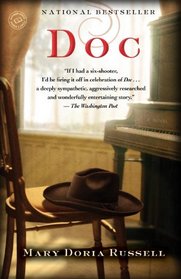This author has an engaging command of the English language. She brings the whole era of the post-Civil War to life with the clink of the coins and the arguing amongst the drunken cowboys in Dodge City, Kansas. Russell tells the life of Doc Holliday before he became famous, while he was a consumptive dentist struggling to stay alive with a debilitating illness.
Because of the research done by this author, this book reads like what Doc would have said and thought. He started life as a Georgian gentleman who earned his dentistry degree in Pennsylvania after the Civil War. I was amazed to hear Holliday's MD-uncle tell his nephew to get a degree in dentistry because medicine was generally practiced by quacks and snake-oil sellers! One of the reasons that Holliday was so successful in dentistry school was because of his skill as a pianist (his finger dexterity).
Soon after Holliday set up practice, he was diagnosed with tuberculosis and encouraged to move west for the drier and cleaner air. He moved to Texas, but a national depression soon removed the opportunity to have a dentistry practice. As a youngster, he'd learned to play cards at home; now he used that skill to cover his living expenses.
I happen to be listening to this book and the reader is Mark Bramhall. His gritty voice adds a great deal to the story. Much of this book is about the relationship between the Earp brothers with Doc. One point the author makes is that Doc and Morgan were really the closer friends (not Wyatt and Doc, as many presume). Once Morgan died, the other Earps and Doc separated and lost connection with each other.
This book portrays Doc as a gentle, generous Southerner who could become angry quickly and then released his anger just as quickly. He was also the most intelligent man in his circle of friends. One thing I noticed, however, is that the story is fascinating at first and then it drags along for a while. The closing chapters are of great interest (again). One fascinating fact the author shares is that Margaret Mitchell (author, Gone With the Wind) was a Holliday relative and she heard many stories about the Hollidays and incorporated them into the background of her novel.
This story, based on private diaries and papers, gives a truer biography of Doc Holliday than most. The author states that Bat Masterson wrote a defamatory story of Doc that has stood as the truth for about 100 years. The author wrote this book in order to give a more honest explanation of Holliday's short life.
Because of the research done by this author, this book reads like what Doc would have said and thought. He started life as a Georgian gentleman who earned his dentistry degree in Pennsylvania after the Civil War. I was amazed to hear Holliday's MD-uncle tell his nephew to get a degree in dentistry because medicine was generally practiced by quacks and snake-oil sellers! One of the reasons that Holliday was so successful in dentistry school was because of his skill as a pianist (his finger dexterity).
Soon after Holliday set up practice, he was diagnosed with tuberculosis and encouraged to move west for the drier and cleaner air. He moved to Texas, but a national depression soon removed the opportunity to have a dentistry practice. As a youngster, he'd learned to play cards at home; now he used that skill to cover his living expenses.
I happen to be listening to this book and the reader is Mark Bramhall. His gritty voice adds a great deal to the story. Much of this book is about the relationship between the Earp brothers with Doc. One point the author makes is that Doc and Morgan were really the closer friends (not Wyatt and Doc, as many presume). Once Morgan died, the other Earps and Doc separated and lost connection with each other.
This book portrays Doc as a gentle, generous Southerner who could become angry quickly and then released his anger just as quickly. He was also the most intelligent man in his circle of friends. One thing I noticed, however, is that the story is fascinating at first and then it drags along for a while. The closing chapters are of great interest (again). One fascinating fact the author shares is that Margaret Mitchell (author, Gone With the Wind) was a Holliday relative and she heard many stories about the Hollidays and incorporated them into the background of her novel.
This story, based on private diaries and papers, gives a truer biography of Doc Holliday than most. The author states that Bat Masterson wrote a defamatory story of Doc that has stood as the truth for about 100 years. The author wrote this book in order to give a more honest explanation of Holliday's short life.
This is the first book by Russell I've read since The Sparrow and Children of God, which I loved. Her writing is witty and on-point as in the other books, but the topic just wasn't as interesting. The book details Doc Holliday's life until just before he and the Earps leave for Tombstone but I think there's a reason other accounts tend to focus on the events at Tombstone; they're just more interesting than anything that happens in the course of this novel. If you want a detailed backstory for those characters then I would certainly recommend this book. Otherwise I would probably try something else.




